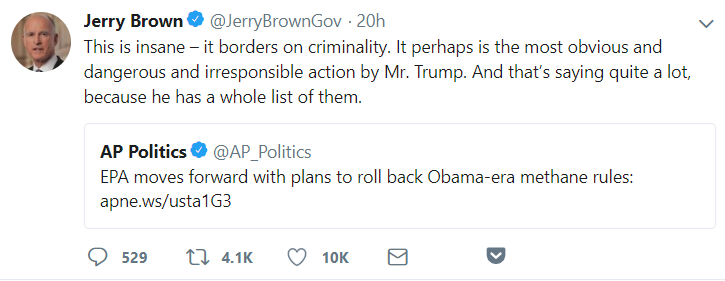Addendum, Sept 19: The Trump administration yesterday formally adopted the proposed rules we wrote about last week, below. The New York Times’ Lisa Friedman reports the details.
“This is insane – it borders on criminality,” said California Gov. Jerry Brown yesterday about President Trump’s proposed revisions to Obama administration regulations on methane emissions from oil and gas wells.
Brown has authority to speak, and not just because on Monday he signed SB (California Senate Bill) 100, which commits the Golden State to a 100% carbon-free electricity sector by 2045. Brown’s entire 16-year career as governor (1974-1982 & 2008-2016) has been one of breathtaking, broad-based innovation in energy efficiency, renewable energy and environmental protection.

The longest-serving governor of the largest state pulls no punches.
Not just in California but across the U.S., fridges and A/C’s consume less electricity, cars burn less gasoline, and tailpipes pollute less because Brown’s administrations pioneered the required engineering, regulations and politics. If any human being living or dead has done more than Gov. Brown to cut carbon emissions, I’d like to know her name.
The Obama reg’s targeted natural gas leakage, venting and flaring by requiring more frequent inspection of leaks from gas wells and pipelines and expedited repairs. The Trump revisions will cut inspection frequencies at wells and compressor stations and extend repair deadlines, as reported yesterday by Romany Webb, Senior Fellow and Associate Research Scholar at Columbia University’s Sabin Center for Climate Change Law. Watering down the Obama rules will mean more heat-trapping methane released to the atmosphere.
Exactly how much more methane is hard to pinpoint but EPA estimates appear to be around 50,000 excess tons in 2020, rising to just over 100,000 in 2025. (Those are the two years displayed in Table 1.1 of EPA’s Regulatory Impact Analysis; the figure rises over time because the Obama reg’s being watered down apply to new wells only.) We’ll use the approximate 2025 figure, 100,000 tons per year as representative of the next 10-15 years.
“Methane is a highly potent greenhouse gas,” Ms. Webb reminds us in her informative post, “trapping approximately 87 times more heat in the earth’s atmosphere than carbon dioxide in the first 20 years after it is released, on a pound-for-pound basis.” Applying that multiplier, the additional 100,000 tons of methane per year will have the same climate-change impact as 8-10 million tons a year of additional CO2.
Total U.S. emissions of CO2 currently run between 5 and 6 billion tons, while emissions of methane and other GHG’s add the equivalent of another 1 billion or so (all figures are in short tons and are approximate). The Trump/EPA rollback will thus add less than two-tenths of one percent (0.2%, or one part in 500) to America’s climate pollution emissions.
If the rollback’s numerical impact is so small, why is it so odious?
First, the Obama rules being watered down were the opposite of revolutionary; they adhered to the time-honored (and bipartisan) pollution-control paradigm of covering only new or expanded emissions sources, an accommodation that circumvents arguably costlier “retrofitting” of existing sources.
Second, they’re eminently doable. Inspecting and fixing leaky wells and other gas infrastructure is good housekeeping, pure and simple. And they’re easy to follow.
Third, the methane rules bring substantial co-benefits: They create jobs. They cut down on “local” (toxic) pollution. They protect workers. And they’re at least partially cost-offsetting since the saved methane can be delivered and sold.
Fourth, they’re a giveaway to an industry that needs none: the U.S. oil and gas sector. With over a quarter of a trillion dollars a year in profits, and with annual contributions to Congress nearing a third of a billion dollars a year, America’s oil and gas industry is the last segment of our society in want of more federal largesse. (Figures are from Oil Change International; contributions figure includes coal companies.)
Last, as OCI reminds us in its mission statement: The production and consumption of oil, gas, and coal are major sources of global warming, human rights abuses, war, national security concerns, corporate globalization, and increased inequality. Anything that further incentivizes fossil fuel extraction and usage, as the Trump-EPA methane reg rollback will do, only exacerbates that.
In short, the rollback is quintessential Trump: spiteful, short-sighted, ignorant, amoral.
Jerry Brown is right on Trump and right on climate. He’s wrapping up his lifetime of public service on the highest possible notes of policy, leadership and moral clarity. The opposite of what we suffer with the White House.

Echo Sierra says
Then fix Aliso Canyon. Worst U.S. leak. Went on for months. Hundreds exposed. No punishment, no accountability..
Drew Keeling says
Thanks for this systematic summary. Note, however, that the long term climate impact of methane is relatively small because the emissions of it are relatively small compared to CO2, and it breaks down fairly quickly into CO2.
Jerry Brown’s overall grasp of environmental issues has nonetheless long been impressive, and his pragmatic instincts keen. Small wonder that he has been both the youngest and oldest California governor since the 1860s.
The 28 years between his first and second tenures as governor should, however, raise questions about the caliber of potential future California governors.
And it is a pity that even he could not manage to push through at least some kind of minimal initial carbon tax, especially since California is (still, at least occasionally) thought to be a positive leading future indicator for other places, and for America generally.